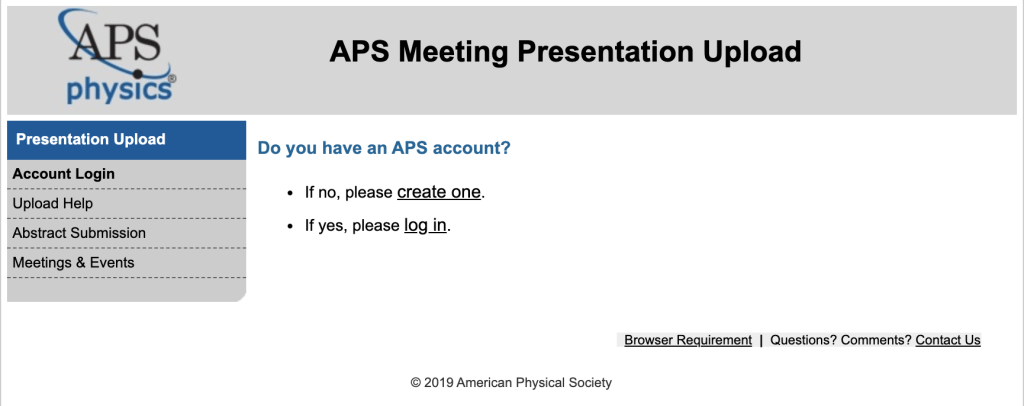Unlock Your Research Potential With APS Abstract Submission: Submit Now And Make An Impact!
APS Abstract Submission: A Guide for Smart Readers
Greetings, Smart Readers! In this article, we will delve into the world of APS abstract submission. If you are a researcher or academician looking to present your work at a prestigious conference, understanding the ins and outs of abstract submission is crucial. APS, or the American Physical Society, is a renowned organization that hosts conferences and publishes research in the field of physics. Let’s explore the details of APS abstract submission and how it can benefit you as a researcher.
Introduction
Abstract submission serves as a gateway for researchers to share their findings with a wider audience. It is a concise summary of their research work, highlighting the key objectives, methodology, results, and conclusions. APS abstract submission offers researchers an opportunity to present their work at one of the prestigious APS conferences, which attracts experts from around the globe.
3 Picture Gallery: Unlock Your Research Potential With APS Abstract Submission: Submit Now And Make An Impact!



When submitting an abstract to APS, it is essential to provide accurate and comprehensive information about your research. This includes a clear title, author details, affiliations, and a well-structured abstract with a maximum word limit. Ensuring that your abstract meets these requirements will enhance your chances of acceptance and increase your visibility in the scientific community.
What Is APS Abstract Submission?
APS abstract submission is the process of submitting a summary of your research work to the American Physical Society. It allows researchers to showcase their findings and contribute to the overall body of knowledge in the field of physics. The abstract should provide a concise overview of your research and entice the readers to learn more about your work.
The Importance of APS Abstract Submission

Image Source: aps-med.de
Submitting your abstract to APS conferences holds several advantages. Firstly, it allows you to present your work to a knowledgeable audience, including experts in your field. This provides an excellent platform for networking and collaborating with fellow researchers. Secondly, APS conferences attract a wide range of attendees, including potential employers, funding agencies, and industry professionals. By presenting at these conferences, you increase your chances of securing job opportunities, funding grants, and partnerships.
The Process of APS Abstract Submission
The process of APS abstract submission typically involves several steps. Firstly, you need to select the appropriate APS conference that aligns with your research topic. APS hosts various conferences throughout the year, each focusing on different aspects of physics. Once you have selected the conference, you can proceed with creating your abstract.
Writing a compelling abstract is crucial for successful submission. It should include a clear statement of the problem, the methodology employed, major results, and a succinct conclusion. The abstract should be concise, engaging, and easy to understand for both experts and non-experts in the field.
After creating your abstract, you can submit it through the APS online submission portal. Make sure to carefully follow the guidelines provided by APS, including word limits, formatting requirements, and submission deadlines. Once your abstract is submitted, it will undergo a review process by experts in the field. The acceptance or rejection of your abstract will be communicated to you within a specified timeframe.
Advantages and Disadvantages of APS Abstract Submission

Image Source: aps-med.de
APS abstract submission offers several advantages for researchers. Firstly, it provides a platform to disseminate research findings and gain recognition within the scientific community. Secondly, presenting at APS conferences allows researchers to receive valuable feedback and suggestions from experts, which can further enhance their work. Additionally, APS conferences offer networking opportunities, enabling researchers to forge collaborations and expand their professional network.
However, there are a few disadvantages to consider. Firstly, the competition for abstract acceptance can be intense, as researchers from around the world submit their work. Therefore, it is crucial to ensure the quality and novelty of your research to stand out among the rest. Secondly, attending APS conferences can be costly, especially for researchers with limited funding. It is essential to consider the financial implications before committing to present at these conferences.
Frequently Asked Questions (FAQ)
1. Is APS abstract submission open to researchers from all fields of physics?
Yes, APS abstract submission is open to researchers from all fields of physics. APS hosts conferences covering various sub-disciplines, ensuring a diverse range of research topics.
2. Can I submit multiple abstracts to the same APS conference?

Image Source: aps.org
Yes, you can submit multiple abstracts to the same APS conference. However, it is advisable to focus on quality rather than quantity, ensuring that each abstract showcases unique and impactful research.
3. How long does the review process for APS abstracts take?
The review process for APS abstracts typically takes a few weeks. The exact timeframe may vary depending on the conference and the number of submissions received.
4. Are there any specific formatting guidelines for APS abstract submission?
Yes, APS provides specific formatting guidelines for abstract submission. These guidelines include word limits, font size, spacing, and section headings. It is essential to adhere to these guidelines to ensure your abstract’s eligibility for review.
5. Can I make changes to my submitted abstract after the submission deadline?
Generally, APS does not allow changes to submitted abstracts after the submission deadline. It is, therefore, crucial to review your abstract carefully before submitting it.
Conclusion
In conclusion, APS abstract submission offers researchers an excellent opportunity to showcase their work, gain recognition, and collaborate with experts in the field of physics. By carefully following the submission guidelines and creating a compelling abstract, you can increase your chances of acceptance and make a meaningful impact in the scientific community. So, take the plunge and submit your abstract to APS today!
Disclaimer: The information provided in this article is based on general knowledge and guidelines provided by APS. It is advisable to refer to the official APS website for the most up-to-date and accurate information regarding abstract submission.
This post topic: Abstract


